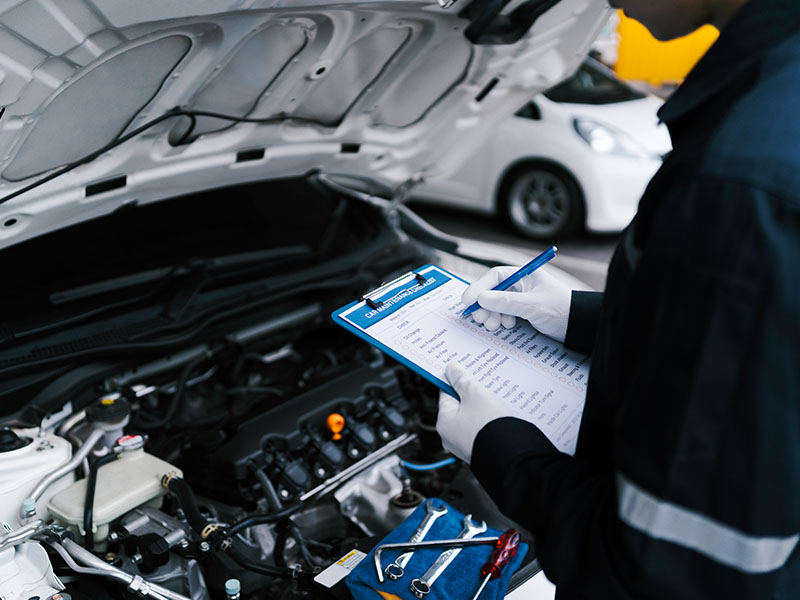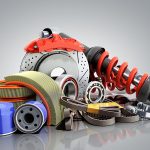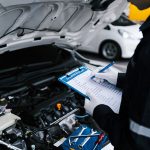Regular maintenance will keep your car safe and functional for a long time. Regular maintenance not only saves you money on repairs but it also protects you. If you are searching for vehicle repair services near me or just want to maintain the smooth operation of your vehicle this checklist outlines the crucial actions that all drivers must do. Let’s now examine the essential components that require routine care to maintain your car in excellent condition.
1. Regular Oil Changes:
- Why it Matters
Your engine will not work correctly without oil. It reduces friction by lubricating all moving parts and promotes engine cooling. Oil becomes filthy and loses efficiency over time. Failure to change it regularly may necessitate its replacement which can harm your engine and cost you money. - How Often to Change
The frequency you should change your oil depends on your vehicle, how much you drive, and the type of oil you use. Most modern vehicles require an oil change every two to six months or every 5,000 to 10,000 miles. These intervals must be followed to keep your engine in good working order. - Signs It’s Time for a Change
When the oil change light illuminates your engine produces strange noises or your oil seems black and unclean it’s time to replace the oil. If you ignore these signs you may face a big disaster in the future. So you have to contact the best auto car mechanic in Ajman.
2. Tire Maintenance:
- Checking Tire Pressure
Proper tire stress enhances tire life, reduces gas consumption, and protects your riding safety. Underinflated tires wear faster and are more difficult to ride. Once a month it’s a good idea to check your tire pressure and fill it to the required level according to your car’s handbook. - Tread Depth Inspection
Your car’s ability to grip the road, particularly in rainy or slick circumstances is attributed to the tread on your tires. The tread deteriorates and loses its effectiveness with time. Every three months or every 5,000 miles you should examine the tread. To measure it use a basic instrument such as a quarter. For safety, it’s time to get new tires if the tread is too shallow. - Tire Rotation
Depending on where they are on the vehicle tires wear out differently. They will wear more evenly and last longer if you rotate them every 5,000 to 7,000 miles. To save time you may just rotate them when you get your oil changed.
3. Brake System Checks:
- Importance of Functioning Brakes
Brakes should be painted since they are one of the most important safety features of your car. They help you stop avoiding crashes safely and surprisingly. If you put off maintaining your brakes for too long your entire braking system is likely damaged and repair costs should increase. - Signs of Brake Issues
If you feel the car dragging to one side hear screeching or grinding when you apply the brakes or notice that stopping takes longer your brakes need to be serviced. The brake pedal vibrating or feeling soft when pressed is another indication. - When to Seek Professional Help
As soon as you notice any of these symptoms you must consult a trained professional and the best auto car mechanic. Ignored brake repairs might make the problem worse and risk your safety when driving.
4. Fluid Levels Monitoring
- Essential Fluids to Check
Transmission fluid, brake fluid, coolant, power steering fluid, and windscreen wiper fluid are just a few of the essential fluids that your car requires. These fluids keep your car running smoothly by cooling the engine, lubricating its components, and aiding with vehicle control. - Why Maintaining Fluid Levels Matters
Major faults and costly repairs can be avoided by keeping these fluids at the right level. If your car’s fluid levels go too low, various parts may wear out faster, overheat, or stop working altogether. - How to Check Fluid Levels
Checking your car’s fluids twice a month is a good idea. Always change or restore fluids when necessary and consult your car’s handbook for the precise timetable.
5. Battery Health Inspection:
- Signs of a Weak Battery
If your battery is poor your car may start slowly, dim its lights, or turn on the dashboard warning lights. Your battery probably needs repair since it’s running low if you see any of these symptoms. - Maintaining Battery Condition
Every 7,500 miles you should check the state of your battery to prevent issues. To avoid corrosion and make sure it’s functioning correctly you should verify its charge and clean the terminals. - When to Replace the Battery
Car batteries typically last one to two years. It’s a good idea to replace your battery before it dies if it’s getting close to that age. When you need your automobile the most you do not want to be stranded with a dead battery.
6. Light and Electrical System Checks:
- Importance of Functional Lights
Functional lights are essential for both your safety and the safety of other drivers. Your turn signals, brake lights, and headlights are very important. They assist you at night and let other drivers know what you are about to do. Should any of these lights be off you run the chance of being involved in an accident. - Regular Inspections
Every six months you should get your electrical system and lighting inspected. You may also verify that everything is functioning correctly by walking around the car and turning on your lights. - Addressing Electrical Issues
It is advisable to have an electrician inspect the wiring if you observe flickering lights or other electrical issues such as issues with the power windows. By addressing minor electrical faults early on you can prevent more serious ones later on.
7. Air Filter and Cabin Filter Maintenance:
- Why Filters Matter:
Air filters should be replaced once a year, or every 10,000 to 15,000 miles. If you travel to a dusty or polluted area, you may need to change them sooner. Maintaining clean filters enhances the quality of the air inside your automobile and helps it run more smoothly. - Inspection Frequency:
Air filters should be replaced once a year, or every 10,000 to 15,000 miles. If you travel to a dusty or polluted area you may need to change them sooner. Maintaining clean filters enhances the quality of the air inside your automobile and helps it run more smoothly.
How OBD Alerts Drivers to Potential Problems
Your car’s performance may be tracked in real-time using OBD Car Workshop tools. Before they do significant harm these systems are intended to identify problems like faulty sensors, gearbox troubles, or even engine problems. Regularly inspecting your car’s OBD system will help you keep track of its condition. The OBD system is simple for mechanic for car to connect to diagnose particular issues and perform necessary repairs. By detecting issues early you may keep your car in better condition and save future expensive repairs by avoiding significant failures.
Conclusion
You can keep your automobile operating smoothly, safely, and for many years by adhering to a regular car maintenance checklist. You may prevent expensive repairs and unplanned failures by doing simple maintenance like routine oil changes, fluid level checks, and brake inspections. Regardless of whether you are looking for auto car maintenance tips or vehicle repair services near me, it’s critical to regularly perform the necessary maintenance. For all of your auto maintenance requirements, OBD Auto Garage is the greatest option, guaranteeing that your automobile will always be in excellent shape. Keep in mind that a well-maintained vehicle saves you money and keeps you safe. Your automobile will take care of you if you take care of it.
Read More:
5 Warning Signs Your Car Needs Immediate Repair: Do Not Ignore These Red Flags
5 Dashboard Warning Signs Your Car Needs Immediate Repair: Do not Ignore These Red Flags!
Stress-Free Professionalizes Auto Care Services With OBD Auto Garage
The Benefits of Using Genuine Car Parts for Repairs
Key Benefits of Regular Car Maintenance Services





